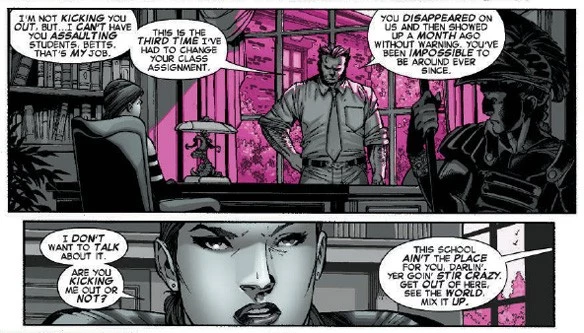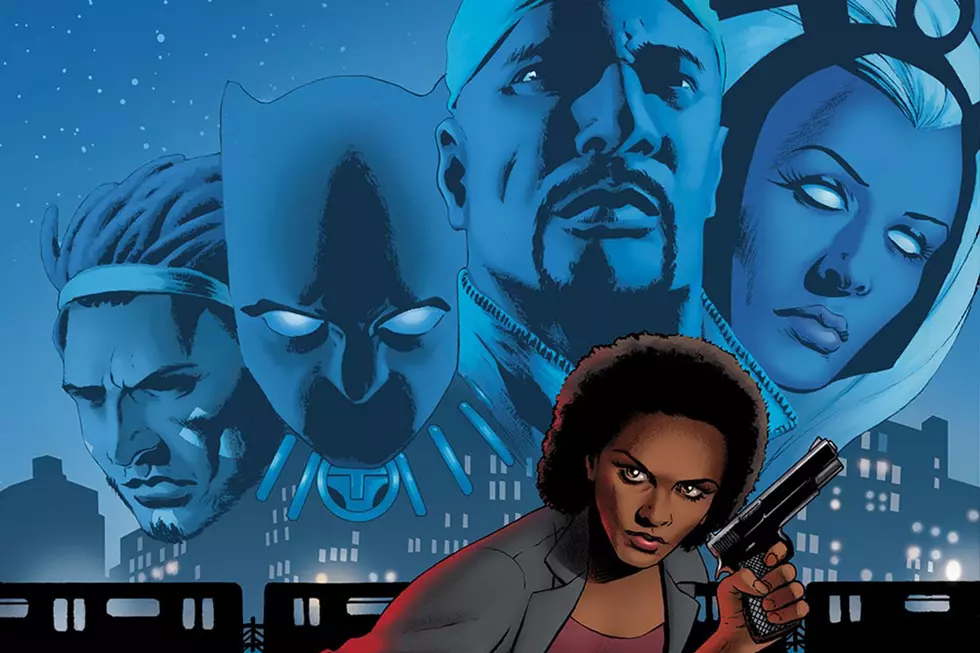![‘Uncanny X-Force’ #1: Mutants Got Problems, Y’all [Review]](http://townsquare.media/site/622/files/2013/01/uxf01.jpg?w=980&q=75)
‘Uncanny X-Force’ #1: Mutants Got Problems, Y’all [Review]

The X-Men have been through some pretty rough stuff. That's actually kind of their deal; "going through rough stuff" is the default setting for those mutants, and the only time they're not going through rough stuff is when they've either just finished going through something terrible or are just about to go through something terrible, two states that tend to coexist on two or three pages about twice a year.
Right now, though, the X-Men have been through even more than usual, and for the Marvel NOW relaunch of Uncanny X-Force, Sam Humphries and Ron Garney have picked a team where every member has their own demons to deal with, and the end result is a mix of personalities that's already fun to read about right from the first issue.

Of course, Uncanny X-Force is in a pretty interesting position to begin with. The original conceit of the previous series was that they were essentially the X-Men's black ops squad, running around wearing red contact lenses and doing cool murders at night. But in Rick Remender's run, one of our picks for best comics of 2012, there was an interesting change. The idea of dealing with threats that could only be stopped with lethal force grew and changed to become a book about dealing with threats that were simply bigger than what the other teams were facing, but that still kept that edge of questionable morality. They were the team that had to deal with a young Apocalypse and decide whether it was worth it to kill an innocent child to potentially change the future, and the team that spent an arc hanging out fighting fantasy monsters in Otherworld when an entire multiverse was threatened.
By all rights, that's the kind of stuff that should take a pretty hefty psychological toll on someone, and when Humphries and Garney pick up for their story, that's exactly what's happening with Psylocke. Her team's been disbanded, her attempt at teaching at the Jean Grey School isn't working out, and if she's anything like me, she had to spend a good half hour trying to figure out whether she had a psychic katana or just a real katana and that psychic knife she punches people in the brain with all the time (I'm actually still not sure, so feel free to help me out on this one).
As far as superheroics go, that's pretty standard stuff when it comes time to motivate someone to start a new team, but Humphries makes it work with a deceptively simple trick: He writes Psylocke as someone who's holding something back. It's not a particularly revolutionary storytelling tactic, and he's even able to throw in a six-month gap to seal the deal, but he makes it work really well. Ever since she came back from the dead -- which isn't all that out of the ordinary for the X-Men -- we've seen Psylocke dealing with all kinds of bizarre business both in terms of heroism and her personal life. We've seen a relationship with Angel falling apart and we've seen the start of one with Fantomex, a man whose previous girlfriend was a spaceship made of his own nervous system. And because we've seen these events and because we've followed along (and because she starts this book grumpily flying through the air on an art deco rocket cycle so that she can go fight a six-armed teleporting alien), the fact that there's something beyond all that that Psylocke won't discuss, something that's affecting her life and sending her back into the world of stabbing people with focused totalities on a monthly basis, makes her a very interesting character right from the start.
I talked to Humphries about the book a few months ago, and he mentioned that he wanted to focus on Psylocke and show her life in a state of transition. He sets that up nicely here with her interactions with everyone around her. There's a great scene early on with Wolverine (what, you didn't think there was going to be an X-Men book without Wolverine, did you?) that shows their relationship in a way I never really expected:

The idea is that Wolverine can see that Psylocke needs to be in action in order to work through her problems, but he can't be the one to lead her there because he's moved into a different role with the school. So he gives her just enough information to go out and get herself involved in a problem that he also needs to take care of.
If it was written even slightly differently, this scene would risk coming off as weird and manipulative on Wolverine's part, but it doesn't. Humphries' dialogue and Garney's body language work together beautifully here, creating a subtext of understanding and the knowledge that these are two characters for whom stabbing people repeatedly with sharp objects is usually the best way to reach a moment of clarity.
It's not just those two characters, either. The entire first issue is built on interactions between characters who have been through drastic life changes; people who bottle up their emotions without ever discussing them in the open. The scene where Psylocke lays out what's been going on with Storm is particularly telling...

...especially since those are the events that brought us the return of the mohawk.
Everyone in the book is at a low or otherwise weird point in their life. Puck is described as having just made it out of actual, literal Hell (and also he's Puck, so he wasn't in a great postion to start). Fantomex is up to shennanigans that I don't even want to come close to spoiling for those of you who haven't read the issue. All of this makes it easy to want to see the heroes come together and bulid something new -- so easy that it would've been the simplest thing in the world for it to drift into cliché. But it doesn't.
The dialogue, the body language, the facial expressions, they all make this book work. I've been a fan of Garney's since his work on Captain America with Mark Waid back in the '90s, and he hasn't missed a step since. Uncanny X-Force #1 is clear, quick, engaging and surprising, and those are the best things a first issue can be.
Uncanny X-Force #1 goes on sale this Wednesday in your local comics shop and digitally from ComiXology.
More From ComicsAlliance

![Simon Baz And Jessica Cruz Meet Doctor Polaris In ‘Green Lanterns’ #19 [Preview]](http://townsquare.media/site/622/files/2017/03/GLs00.jpg?w=980&q=75)



![Comics’ Sexiest Female Characters (From A Queer Perspective) [Love & Sex Week]](http://townsquare.media/site/622/files/2017/02/hg_featured.jpg?w=980&q=75)



